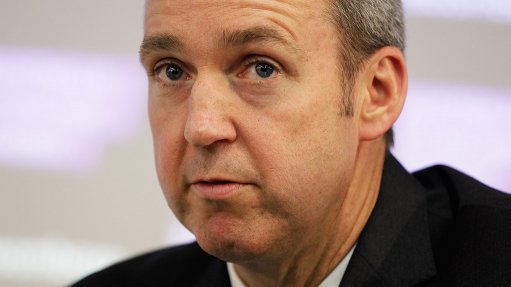
South32 CEO Graham Kerr
PERTH (miningweekly.com) – Diversified miner South32 on Thursday reported a pre-tax impairment charge of $504-million over its South African Energy Coal assets for the year ended June, announcing that it has now entered into exclusive negotiations to divest of this asset.
South32 in 2017 announced plans to sell the South African Energy Coal operations, with CEO Graham Kerr telling the media on Thursday that the company had undertaken a comprehensive and competitive process to divest of the asset.
The miner has entered into exclusive negotiations with Mike Teke-led Seriti Resources, which Kerr said would include a "modest" up-front cash payment and a sharing of any commodity price upside over an agreed period.
“When we look at the offer that is sitting on the table, we think it’s a good one in terms of what Seriti brings to the table in synergies, and ensuring that the South African energy coal business becomes sustainable,” Kerr told journalists on a call in which Mining Weekly Online participated.
Teke commented in a statement welcoming South32's announcement that this was an "exciting step forward for Seriti".
“We look forward to continued engagement with South32 as we work together towards concluding a binding agreement. Should a sale agreement be reached, these assets would become a further important anchor of Seriti’s domestically focused coal business. This would be a further significant investment in the South African mining sector by South African investors, backed by a proven record of responsible operation,” he added.
Seriti, which has ambitions to become a black-owned mining champion, last year also bought global diversified miner Anglo American's Eskom-tied coal mines in South Africa.
Kerr said that over the past two years, South32 had invested $377-million into the South African energy coal business, including $185-million to develop the Klipspruit extension project, which would add some 20 years to the colliery's life.
On the back of the impairment charges related to the South African energy coal operations, South32 reported a 13% drop in underlying earnings before interest, taxes, depreciation and amortisation (Ebitda), which reached $2.19-billion during the 2019 financial year, down from the $2.51-billion in the previous financial year.
Revenue for the full year declined by 4%, to $7.27-billion, from the $7.54-billion in 2018, while profit after tax and finance costs declined by 71%, from $1.33-billion to $389-million.
Kerr pointed out that the company achieved record production at its Hillside aluminium operation, as well as a 57% increase in volumes at its Illawarra metallurgical coal operations, while manganese ore production reached 5.5-million tonnes in the year, underpinning a 3% increase in group production volumes.
“We continued to reshape and improve our portfolio, funding the acquisition of the Hermosa project and a 50% interest in the Eagle Downs metallurgical coal project from our cash reserves, and announcing the review of our manganese alloy business.
“We released a mineral resource estimate for the Taylor deposit at Hermosa, which is a key milestone as we progress one of the most exciting base metals projects in the industry. Work undertaken since its acquisition has significantly de-risked our investment, increased our confidence in the project, and confirmed its ability to deliver strong returns to shareholders over many decades.”
Looking ahead, Kerr expected South32’s production volumes to increase by a further 3% in the 2020 financial year, with the Illawarra metallurgical coal project on track to return to a three longwall configuration in the June 2020 quarter, while the Worsley alumina refinery is expected to achieve nameplate capacity following an improvement in calciner availability.
Furthermore, higher production volumes, weaker producer currencies and lower raw material input costs, along with the continuation of initiatives to mitigate inflation and maintain margins, are expected to result in lower operating unit costs for the majority of South32’s operations in the 2020 financial year.
“Our flexible and disciplined approach to capital management remains unchanged; we will continue to prioritise the strong balance sheet to ensure we retain flexibility through economic cycles while creating competition for excess capital and creating value for shareholders,” Kerr said.